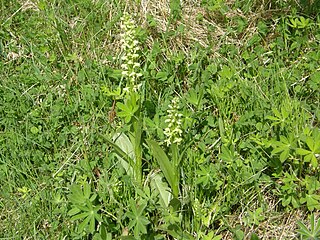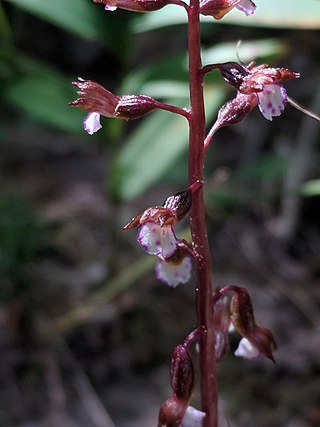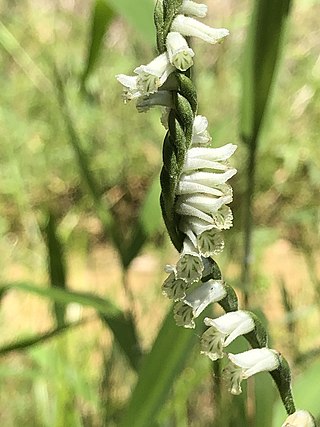
Cypripedium is a genus of 58 species and nothospecies of hardy orchids; it is one of five genera that together compose the subfamily of lady's slipper orchids (Cypripedioideae). They are widespread across much of the Northern Hemisphere, including most of Europe and Africa (Algeria), Russia, China, Central Asia, Canada the United States, Mexico, and Central America. They are most commonly known as slipper orchids, lady's slipper orchids, or ladyslippers; other common names include moccasin flower, camel's foot, squirrel foot, steeple cap, Venus' shoes, and whippoorwill shoe. An abbreviation used in trade journals is "Cyp." The genus name is derived from Ancient Greek Κύπρις (Kúpris), an early reference in Greek myth to Aphrodite, and πέδιλον (pédilon), meaning "sandal".

Platanthera praeclara, known as the western prairie fringed orchid and the Great Plains white fringed orchid, is a rare and threatened species of orchid native to North America.

Corallorhiza maculata, or spotted coralroot, is a North American coralroot orchid. It has four varieties: C. maculata var. occidentalis, C. maculata var. maculata, C. maculata var. mexicana, and C. maculata var. ozettensis. It is widespread through Mexico, Guatemala, Canada, St. Pierre & Miquelon, and much of the western and northern United States. It grows mostly in montane woodlands.

The genus Platanthera belongs to the subfamily Orchidoideae of the family Orchidaceae, and comprises about 150 species of orchids. The members of this genus, known as the butterfly orchids or fringed orchids, were previously included in the genus Orchis, which is a close relative. They are distributed throughout the temperate regions of the Northern Hemisphere. They are terrestrial and have tubercules.

Platanthera blephariglottis, commonly known as the white fringed orchid or white-fringed orchis, is a species of orchid of the genus Platanthera. It is considered to be an endangered species in Connecticut and Ohio, a threatened species in Florida, Maryland and Rhode Island, exploitably vulnerable in New York, and susceptible to be threatened in Québec.

Quercus rugosa, commonly known as the netleaf oak, is a broad-leaved tree in the beech and oak family Fagaceae. It is native to southern North America.

Platanthera psycodes, commonly called lesser purple fringed orchid or small purple-fringed orchid, is a species of orchid, genus Platanthera, occurring from eastern Canada to the east-central and northeastern United States. It is imperiled in Illinois, Tennessee, North Carolina, and Kentucky.

Platanthera hyperborea, the northern green orchid, is small orchid found only in Greenland, Iceland, and Akimiski Island in Canada. Numerous authors cite the species as widespread in other parts of Canada and also in the United States; such populations are more correctly referred to as Platanthera aquilonis.

Platanthera flava, the palegreen orchid, is a species of pale-flowered orchid. It is native to eastern North America, from Texas east to Florida, north to Ontario, Quebec and Nova Scotia.

Platanthera orbiculata, the round leaved orchid or lesser roundleaved orchid, is a species of orchid native to forested areas of North America. It is widespread across most of Canada and parts of the United States.

Corallorhiza odontorhiza, common name fall coral-root or small-flowered coral-root, is a species of orchid widespread across eastern and central United States, and reported also from Mexico, Central America, Quebec and Ontario. In North America, it occurs in forested areas up to an elevation of 2800 m.

Platanthera zothecina is a perennial plant in the orchid family (Orchidaceae) found in the Colorado Plateau and Canyonlands region of the southwestern United States and is found in the states of Utah, Arizona and Colorado.

Platanthera dilatata, known as tall white bog orchid, bog candle, or boreal bog orchid is a species of orchid, a flowering plant in the family Orchidaceae, native to North America. It was first formally described in 1813 by Frederick Traugott Pursh as Orchis dilatata.

Platanthera aquilonis, the northern green orchid or north wind bog orchid, is a species of self-fertilizing orchid native to the United States and Canada with a widespread distribution across the two countries.

Platanthera convallariifolia, the bog orchid, is a species of orchid native to the Aleutian Islands, far east Russia and northern Japan. It grows in wetlands such as fens and marshes.

Platanthera tipuloides, the Aleutian bog orchid or Bering bog orchid, is a terrestrial orchid native to the United States, Russia, China, Japan and Korea.

Platanthera chorisiana, Chamisso's orchid or Choris' bog orchid, is a terrestrial orchid native to the United States, Canada, Russia and Japan.

Spiranthes torta, the Southern ladies’ tresses, is a terrestrial orchid native to Florida, Mexico, Central America, the Caribbean Islands and Bermuda.

Spiranthes praecox, the grass leaved ladies' tresses, green-vein ladies'-tresses or sometimes giant ladies' tresses is a terrestrial orchid endemic to the United States, growing on the eastern coastal plains and around the Gulf Coast.

Spiranthes casei, or Case's lady's tresses, is a species of orchid native to the northeastern United States and Canada.





















